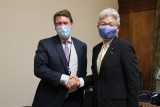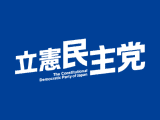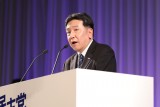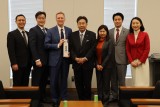2020年2月18日
Three Principles for a New Society―Leader’s Speech at the Constitutional Democratic Festival 2020
Abstract of the speech of Yukio Edano, Leader of the Constitutional Democratic Party of Japan, delivered at the Constitutional Democratic Festival 2020 held on February 16, 2020.
■ The Current State of Japanese Society
I am confident that Japan will have a bright future if we can succeed in overcoming division and isolation, thus eliminating the sense of despair.
Japanese society has undergone a 180-degree change, becoming a society with a declining population and a mature economy. Even so, we are prisoners of the success of the Showa Era. We have reached the limit for many of the things forcibly continued after this time, and contradictions have become evident.
I strive not only to defeat the Abe administration. We will awaken from the spell of Japan’s Showa Era success, and break free from the heavily centralized society focused only on material expansion. Through this, we will establish a government that not only strongly touts the principles of a new society suited for a declining population and mature economy, but that will also be certain to realize such a society.
I would like to take this opportunity to share the three principles that serve as a vision for this new society, as presented at the House of Representatives plenary session.
■ Reassurance through mutual support
The first principle is establishing reassurance through mutual support.
A super-aged society should be one in which people are blessed with long lives, a dream of people throughout the ages, and this should be something desirable. An aging society can be a bright society if anxiety about old age can be alleviated.
Because wages do not rise even with work, many young people cannot even think about the future, such as having a family or children. If we can create a society in it is possible for people who desire to raise children to do so, we can halt, to a certain extent, the decline in population. If we can create a society in which people can gain an education without falling into debt, a society in which people can earn a decent income as a regular employee if they wish, we, particularly youth, will be able to envision various bright futures.
In the past, old age, child rearing and education were entrusted to, and indeed forced upon individuals, families, and local communities. Modernization enabled our country to achieve strong growth in the post-war recovery. Yet at the same time society has urbanized, nuclear families have become the norm, and individuals and their families, or voluntary bonds among local communities, are no longer sufficient. If one considers the dignity of individuals extolled in the Constitution of Japan, it is unforgivable and impossible to force these issues onto families, particularly only onto women. Even so, bound by outdated social images and stressing “self-responsibility,” we have created a society where anxiety and a sense of despair continue to spread.
Now is the time to break free from that idea of “self-responsibility.” Let us give the greatest priority to building society-wide mechanisms for creating reassurance through mutual support. I will create a Japan in which people can live with reassurance, by building and reinforcing society-wide mechanisms for mutual support when people face difficulties related to old age, child rearing, and work.
■ Sharing the wealth
The second principle is invigorating the economy by sharing the wealth.
During the second half of the Showa Era, economic growth was driven by an expansion of exports through standardized mass production. One could say that this was an era when distribution of wealth was enabled by growth. With export companies in mind, it was to a certain extent rational to support growth at that time.
However, exports were not the primary reason for the economic stagnation since the collapse of the bubble. Although Japan’s international competitiveness has declined as emerging economies have caught up, Japan has maintained a certain level of competitiveness. Therefore, the growth rate of exports dramatically surpassed that of Japan’s overall economy, and Japan continued to record a balance of payment surplus. Therefore Japan has not overall grown poorer as a country.
Japan’s largest economic problem is its structures which mean that money does not circulate within the country. Even if large companies earn massive profits through growth, they allocate only limited amounts of those profits to wages, subcontractors and the like, and the portion spent on domestic investment is limited. They merely accumulate internal reserves. Lack of fair distribution means that the disposable income of many people has not increased, and domestic demand, which accounts for more than half of the economy, has not grown. This is hampering overall economic growth. As preconditions have changed as Japan has become an advanced country with a mature economy, and its population has stopped growing and started declining, the prevalent way of thinking of the past five decades surely cannot be accepted today. Even if one ignores these issues, there is no achieve stable economic growth.
No growth without distribution.
By fundamentally altering economic policy taking into consideration the changes in society and promoting sharing of the wealth, I will create both a society in which everyone can feel affluent, and an economy in which domestic demand steadily increases.
■ Responsible and comprehensive government
Third is restoring a responsible and comprehensive government.
“Reassurance through mutual support” and a fair, proper “Sharing the wealth” cannot be achieved by the private sector alone, just based on market principles.
Since the end of the Showa Era, phrases such as “let the private sector do what it does best” and “small government” were considered absolutely right. However, at some point, that idea grew to “let the private sector do even what it does not do well.” The government has become too small and irresponsible, abandoning even the responsibilities it should bear.
This problem is evident in Japan Post Insurance, which arose from the first round of privatization. The common university entrance test was also left up to the private sector. Gambling had been limited to government agencies, but casinos were to be opened to the private sector. In a broad sense, issues of insufficient nursing and care services, and long wait lists for preschools, are government problems that cannot be solved by the private sector alone.
I felt a strong sense of crisis when I visited areas hit by a series of natural disasters. Local governments have been forced to cut their number of workers and to shift to irregular, part-time workers, resulting in drastic shortages of workers able to respond to emergencies. One of the main reasons for the slow response to the novel coronavirus is the lack of a sufficient system for responding to infectious diseases in both the national and local governments.
Now is the time to break free from the illusion of small government. We will once again establish a responsible and comprehensive government, have the government take firm responsibility for what the private sector does not do well, and undertake sound governance. Of course, that is conditioned on regaining trust in the government by restoring constitutionalism and the rule of law, and properly management of government documents and information disclosure.
■ Bottom-up government
In order to realize these three principles, we must fundamentally change how the government functions.
There are countless problems with the Abe adminisrtation, but at the core is its attitude of not listening to the voices of the people. The government does not properly answer what it is asked. The government goes around the Diet and destroys public documents to protect itself. It has no problem saying things that even children know are lies, and then forcing bureaucrats to clean up the mess. Current politics are based on a top down stance—that is, “listen to me because I have the power”—but that engenders dishonesty, and concealing of inconvenient truths.
As society grows more complex and diverse, politicians should be a presence connected to individual citizens. Of course, it is impossible to listen directly to the opinion of each person, one by one. Because everyone has a different opinion, it is also impossible to adopt all of them. Even so, I firmly believe that it is important to take a humble and honest stance, to recognize that there may be voices you are not yet hearing, and to therefore always pay attention to the reality of people’s actual lives.
Although we still have a way to go, the Constitutional Democratic Party of Japan (CDP) is determined to continue to undertake participatory democracy through various efforts including this Constitutional Democratic Festa, partner meetings and CDP cafes in areas throughout Japan, and the online hashtag CDPVoice.
We have touted “all our work prepares us for a change in government” as the core policy for our activities. One pillar of our efforts to bring about a change in government is cooperating and creating a common front with people both in and outside the Diet. This cooperation continues to play a significant role in the current ordinary session of the Diet.
We will create supple connections through strong cooperation based on each other’s strengths, rather than becoming a fragile, massive block. This is the type of administration for which I strive. With that as our goal, our various partner political parties will bring normal order back to the Diet, which is out of touch with people’s lives, by connecting with not only involved parties who speak out, but also the many who are not yet able to do so. With our responsibility as the largest opposition party, the Constitutional Democratic Party of Japan (CDP) will take the lead in creating an even stronger bond based on a broad political force.
At the same time, the Constitutional Democratic Party of Japan will always remain true to its principles and policies, and raise its flag even higher to achieve them. We open our doors widely to those who sympathize with our principles and policies and are willing to together fight under that banner, and we will continue to reinforce our system to fulfill our role as the largest opposition party.
It is said that there will be a general election this year. More than ever, we will make strong progress in cooperation in the Diet, in electoral districts, and in plans for a new government. All of these efforts to unite the opposition parties are so that we can, together with you, jointly create a Japan in which everyone can have hope for the future.
Once again, we resolve to use all these efforts as preparations for a change in government. To create a sense of reassurance through mutual support, sharing of the wealth, and a responsible and comprehensive government. I pledge to all those here today, all those watching, and to all voters that we are resolved to become such a government.
Let’s not halt or turn back, or go left or right, but take a step forward together, toward the future. If you take action, politics will change. We can bring an end to the current government, and create a new one. We are a political party that listens to your voices and moves forward together with you. We call on you to join us in spreading this massive ground swell in your community, and in your field.
We need your strength.









